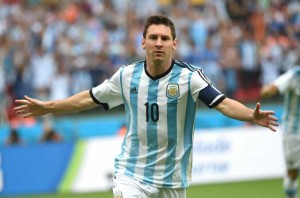
Lionel Messi was 11 years old when his parents Jorge and Celia took him to see endocrinologist Diego Schwarzstein for growth hormone deficiency. Sixteen later he stands on the brink of repeating what his idol did in 1986 – captaining Argentina to the World Cup title.
The story goes that Messi, who suffered a growth hormone deficiency, asked Schwarzstein if he would grow tall enough to be a footballer, reports Xinhua.
“Don’t worry,” Schwarzstein told him. “One day you are going to be taller than Diego Maradona, maybe not better than him, but taller.”
Messi would in fact grow to be four centimetres taller than his idol. But 16 years after that visit to Schwarzstein’s clinic in Rosario, Messi is arguably on the verge of proving the doctor was only half right.
He will Sunday captain an Argentina side aiming for a third World Cup against Germany at Rio’s Maracana stadium.
It would be a crowning glory for a player that is already rated among the greatest in history.
Since making his first-team debut for Barcelona in 2004, Messi has won three UEFA Champions League medals, six La Liga titles and two Spanish Cups.
Individually, he has won the Ballon D’Or – the world’s best player title – a record four times.
But for all his success at the Camp Nou, Messi has been criticised for not replicating his club form for Argentina.
Sunday’s fixture will be his first World Cup final in his third attempt.
In 2006, he was a bit-part player under Jose Pekerman in Germany, when Argentina lost to the hosts on penalties in the quarterfinals.
He failed to score in South Africa four years later when the Albiceleste also fell in the last eight to the same opponents.
Such a record has prompted many to say that Messi’s name cannot be mentioned in the same breath as Maradona.
The former Napoli No. 10 led Argentina to World Cup glory in 1986 with a string of scintillating individual performances. Four years later he took the team to the final, where they were defeated by Franz Beckenbaur’s West Germany.
So would victory for Argentina at the Maracana see Messi supplant Maradona as his country’s best ever player? Who better than Beckenbaur to pass judgement?
“It’s a very fitting comparison. But Maradona was an even more exceptional player than Messi is today,” Beckenbaur told the official website of the German Football Federation (DFB) Friday.
There is a feeling that it is now or never for Messi, who turned 27 last month. Maradona was 25 in 1986 and – despite continuing to be decisive for club and country — was considered to be in decline in Italy four years later.
Former England striker Michael Owen knows all about the ravages of time, having played his best football in his early 20s before his body succumbed to injuries.
“Maybe this is his time,” Owen, who scored against Argentina in the 1998 World Cup, told Goal.com.
“He is at the peak of his career and Argentina have a good chance to win it. If they do then Messi will be regarded together with Maradona.”
Maradona’s former Argentina teammate Osvaldo Ardiles believes Messi has already resolved the dispute, regardless of Sunday’s result.
“Lionel Messi will go down in history as the greatest player of all time, the best that has existed,” Ardiles said.
His view is not shared by Claudio Paul Caniggia, who also played with Maradona for the Albiceleste.
“It’s not fair to compare Messi with Diego in ’86,” the retired forward said.
“Messi is great, he can decide a match with one touch, but right now he is not at the level of Diego Maradona. El Diego in 1986 was something else.”
Not all Argentines are so predisposed to drawing comparisons between the pair.
Journalist Sebastian Perez-Ferreiro said any parallels should only be made later in Messi’s career.
“First he needs to win, and play a critical part in the win,” Perez-Ferreiro said. “Then he needs to take Argentina to another final. It’s a lot — but that’s what Diego did.
“It’s funny because perhaps the journalists are the only ones making the comparison. Messi himself has said he’s not at the same level that Diego was.”
Whatever the outcome Sunday, the debate is unlikely to cease. And somewhere in Rosario, Diego Schwarzstein might remind himself to keep his predictions to the field of medicine.